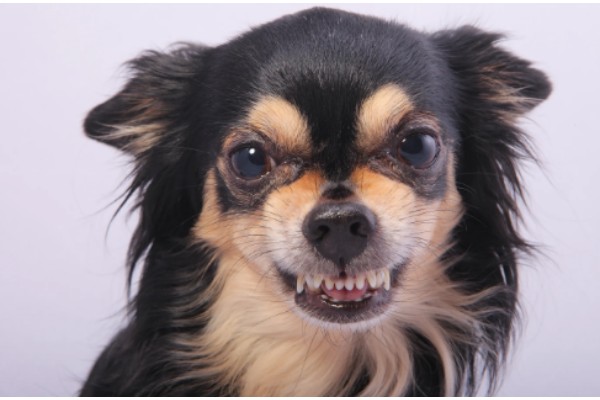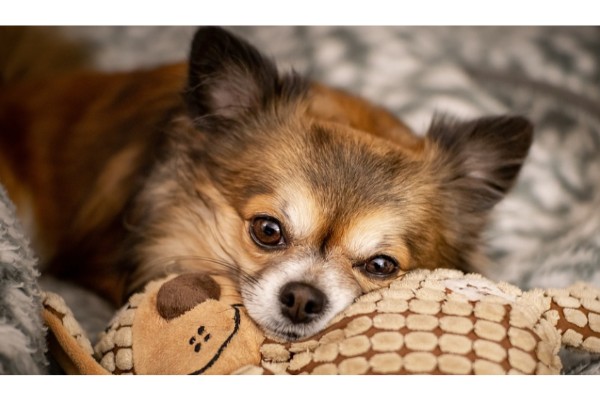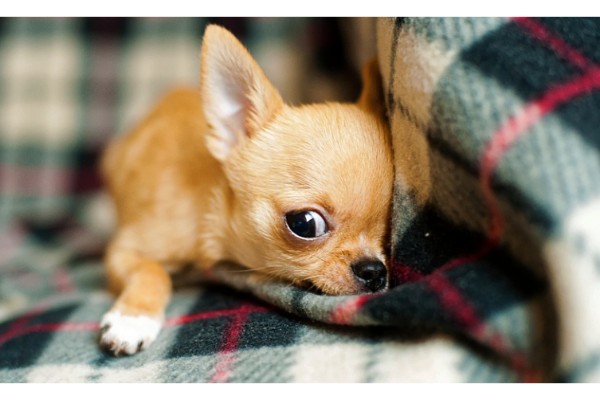Chihuahuas are known for being aggressive, protective, and downright mean, which can be caused by a lack of socialization or training, early experiences, or even health problems, etc. Not all Chihuahuas are aggressive. So, choose a good breeder and socialize your pup well to avoid aggressive tendencies.
Table of Contents
- What Makes Chihuahuas So Rude?
- 1. Protective Of Their Territory
- 2. Not Great With Strangers
- 3. Chihuahuas With Anxiety
- 4. Negative Experiences From Earlier Owners
- 5. Dislike New Or Unfamiliar Places
- 6. Health Problems In Chihuahuas
- 7. Lack Of Socialization
- 8. Fragile Bodies Due To Small Size
- 9. Lack Of Training
- 10. Poorly Bred Chihuahuas
- 11. Fear-Based Aggression
- Are Chihuahuas Generally Aggressive?
- The Typical Chihuahua Personality
- How To Stop My Chihuahua From Being Aggressive
- Summary
What Makes Chihuahuas So Rude?
Aggression in Chihuahuas can be caused by a variety of things. There may be very different causes for various Chihuahuas. To help curb the behavior, owners must learn to understand the circumstances surrounding their Chihuahua’s aggressive outbursts. The following are some of the most typical reasons why Chihuahuas become aggressive.
1. Protective Of Their Territory
Due to their innate tendency to guard their territory and space, chihuahuas make excellent guard dogs. Whether at home or in the dog park, they become defensive when they encounter strangers and are prepared to attack if necessary.
Because Chihuahuas are fiercely protective of their territory, it is best to avoid approaching them when they are napping in their preferred spot if you want to avoid upsetting them. They have reclaimed that area as their own, and they only permit their owner’s access. Additionally, they experience safety in that area, and any outsider who enters that area is trespassing.
In the corner of the living room, on her favorite dog bed, would once lie my friend’s Chihuahua. It was getting dark, so I moved in that direction to turn on the lamp. Her Chihuahua suddenly stood up, growled, and snapped at me so loudly that I was startled and ran as quickly as I could towards the kitchen. I didn’t expect that.
Luckily, now I’ve learned many warning signals to look out for and would like to share them with you so you can avoid this situation:
Chihuahua growling
When a Chihuahua starts growling, you’ll first hear a low-pitch “grrr” sound. This is a signal for you to retreat before they begin to attack. They begin to growl loudly if you stay standing there. Chihuahuas will growl if they are scared of you and want to intimidate you, especially if you are a stranger to them.
Chihuahua showing teeth
A Chihuahua will start showing his teeth after the growling phase of intimidating you. Another alert to keep your distance and avoid trespassing on their territory is this one. They will perceive your disobedience as a challenge and begin to launch and bite you if you don’t comply.

Chihuahua dog stiff body posture
A Chihuahua dog will adopt that stiff body posture prior to launching at you. The stiff body posture of a Chihuahua dog indicates that he is angry with you and believes he can win the argument.
In this case, your best course of action is to avoid making eye contact with the Chihuahua because dogs perceive eye contact as intimidating. Take a soft, slow step away from the Chihuahua.
Chihuahua muzzle punch
Before biting, a Chihuahua can punch a stranger in the heel or feet with its muzzle.
I can still picture myself feeding my friend’s Chihuahua. I placed the chicken on my plate before setting it on the ground rather than placing the chicken in her food bowl. I went away to give her some time to smell and eat, but when I returned, the food had not been touched.
She was offended because she thought I was stealing her food as I transferred the chicken from my plate to her bowl. After chasing me around the house, the little dog bit my ankle. You should never tamper with a Chihuahua’s food, is the lesson here.
Fun Fact: Ever questioned how hard a Chihuahua can bite? You’ll be surprised if you read our article, Chihuahua Bite Force PSI!
Chihuahua’s tail stops wagging
A dog with a wagging tail is typically considered to be happy. A Chihuahua’s tail will stop wagging and stand still when it feels threatened or scared.
You can learn a lot about a Chihuahua’s mood from the way its tail is held. When they sense a threat, they become defensive and stiffen their tail.
2. Not Great With Strangers
Chihuahuas only have one favorite person in their lives—their owners. They are fiercely protective of their owners and will snap and bark at strangers.
As you can see, Chihuahuas dislike meeting new people or dogs, whether they are people or other dogs. Your Chihuahua may even become frightened by unfamiliar faces, in which case he may exhibit aggressive behavior to protect himself.
Ask your friend to be patient with your Chihuahua if they will be coming over often. It is typical for Chihuahuas to need some time to get used to their friend. According to my personal experience, the Chihuahua of a friend didn’t warm up to me for as long as 9 months.
It’s ideal to socialize your Chihuahua while they are still puppies. This will teach your Chihuahua puppy that it’s okay to interact with other dogs, people, and environments without acting aggressively. For the sake of acclimating your Chihuahua puppy to new dogs and people, we advise taking him or her to a dog park at least once a week.
Keep in mind that if something scares a Chihuahua, it will become aggressive. Since it’s a form of defense, it’s best to socialize them so that they won’t become frightened by encounters with other dogs, people, or environments.
Tips on how to stop this aggressive behavior in Chihuahuas:
Bring your Chihuahua to a pet daycare
Your Chihuahua can benefit greatly from daycare services. Find a doggie daycare that has experience with Chihuahuas. Your small dog will feel less fear and, as a result, less irritated when they get used to meeting new people and dogs.
Ask the pet daycare center if they offer the following:
- Socialized playing. Chihuahuas will pick up on canine socialization. Playing with other dogs in a social setting can help your small dog get used to your new dog fairly quickly if you plan to bring home a large dog.
- Obedience training. If the daycare facility has any specialized caregivers who can train your Chihuahua, inquire about them. By doing this, you can better manage your Chihuahua’s vicious aggression. Avoid bringing your Chihuahua to daycare more than three days per week because they prefer a calm and peaceful environment.
- Agility training. Chihuahuas are small and light, which makes them capable of running quickly. You should enroll your small Chihuahua in agility training if they are very active. This will aid in muscle growth and prevent obesity in dogs.

3. Chihuahuas With Anxiety
A stressed-out Chihuahua might act out. As a means of self-defense and to attract their owners’ attention, they will bark obnoxiously.
A Chihuahua can have anxiety from the following:
Separation anxiety in Chihuahuas
If they are left alone for a long time, chihuahuas experience separation anxiety. Chihuahuas adore being with their owners, and you’ve probably seen videos of them crying when their owners go to work.
If you work full-time and must leave your Chihuahua at home for longer than a few hours, be sure to consult your veterinarian or hire a professional Chihuahua trainer to help with your small dog’s separation anxiety.
Your Chihuahua may chew on furniture, scratch at doors, floors, and toilet paper, break things around the house, and chew on furniture if this anxiety problem isn’t resolved.
As an alternative, you could enroll your Chihuahua in a doggie daycare facility so that other dogs can play with him or her and prevent loneliness and neglect.
Loud noises can scare your Chihuahua and cause anxiety
You may already be aware of this, but your tiny Chihuahua can be scared by loud noises like fireworks, thunder, construction work, and heavy rain.
To help your Chihuahua if he is afraid of loud noises, be sure to talk to your veterinarian.
4. Negative Experiences From Earlier Owners
Not all dog owners opt to purchase their pets from breeders. In particular, the rise in the number of dogs in need is contributing to the popularity of rescue dogs. However, many Chihuahuas found in rescue facilities are a little older and have already had at least one owner. Chihuahuas may have been abandoned by some owners due to their aggressive or mean behavior, but other owners may still have them today for other motives.
A Chihuahua that has been rescued may or may not be aggressive. However, a Chihuahua that has been rescued will have had early experiences that you might not be aware of. They might not have been socialized or trained by their previous owner. Some Chihuahuas in rescue situations may have even suffered abuse. These people’s aggression can be set off by a variety of unpredictable factors. So, be patient when handling a Chihuahua rescue that is fearful or aggressive.
Handy Tip: Chihuahuas typically detest grooming sessions, especially having their nails cut. Every time we attempt to trim our Chihuahua’s nails, she cries like a baby and snaps, snaps, and barks. She now handles nail trimming much better because we were able to find a soft and quiet dog nail grinder.
5. Dislike New Or Unfamiliar Places
Chihuahuas dislike frequently moving to new locations. Instead, they prefer to feel safe and stable in their current environment. A new location brings with it a variety of unfamiliar sights, sounds, and scents as well as new inhabitants, pets, and favorite hangouts.
Make sure to ease your Chihuahua into a new home or apartment if you are moving there. It might be too much for him if everything is introduced at once. Create your Chihuahua’s favorite spot in a new house or apartment by using a crate. Crate training is an option if you need to make your Chihuahua feel safe and secure there.
Your Chihuahua will feel more at ease and calm while traveling if you use a mobile crate. Before you relocate, make sure you have one on hand and give your Chihuahua time to get used to it.
6. Health Problems In Chihuahuas
Chihuahuas frequently experience a number of health issues. Unfortunately, unlike humans, our Chihuahuas don’t express pain when they are in it. Dogs are just like that. In order to endure predators for many generations, they have evolved to be brave.
Because they don’t discover the health issues until it’s too late and their tiny, cherished dog is in excruciating pain, Chihuahua owners find it extremely difficult.
Handy Tip: We listed a number of health problems that Chihuahuas can develop and went into great detail about them in our Chihuahua Health Issues: Complete Guide.
Chihuahua owners should have pet insurance because the breed is prone to a number of health problems. Dogs’ behavior can change as a result of health issues, which can occur at any time.
They may react aggressively by baring their teeth, barking, or biting if you try to pet them in an area that is hurt or injured.
We strongly advise that you take your Chihuahua to the vet right away to have a full examination for any health issues if you notice a change in behavior or your dog is crying more frequently.

7. Lack Of Socialization
It’s not just Chihuahuas who experience this. Any dog that hasn’t received the proper socialization is actually more likely to exhibit fear-based aggression toward unknowable objects, people, and animals.
Puppies go through a fear period that lasts from 8 to 16 weeks. Your dog will really remember both the good and the bad experiences at this time! Your dog will therefore become happy and confident around those things in the future if you introduce them to lots of new things and people while also providing them with enjoyable treats and happy feelings. However, if you don’t give your dog these experiences—or if they are very unpleasant—during this time, they are more likely to become fearful and reactive in the future.
A well-socialized Chihuahua is therefore more likely to be content, self-assured, and amiable toward outsiders and other animals. However, a person with poor social skills may respond aggressively out of fear, which frequently comes across as just being mean and grumpy. Even though it will take much longer and require patience, socializing a Chihuahua older than 16 weeks old is still possible.
8. Fragile Bodies Due To Small Size
Chihuahuas have more delicate bones than larger breeds due to their small size. This makes them more brittle and vulnerable to harm. Therefore, a Chihuahua could easily injure themselves by falling off the couch or even while playing with you, other pets, and young children. A Chihuahua may become aggressive or defensive in response to injuries.
Regardless of the breed of your dog, injuries are always painful. However, one study found that owners and doctors thought the Chihuahua breed had a very high sensitivity to pain. In other words, if your Chihuahua suddenly started acting aggressively, it might be because of an injury. This is a key factor in why Chihuahuas won’t always work in households with young children who aren’t old enough to understand how to handle and play with a toy dog.
9. Lack Of Training
Due to their small size, Chihuahua owners frequently disregard the value of obedience training. In any case, it won’t hurt anyone if it jumps up or your arm if it pulls on the leash. Unfortunately, a lack of training can result in a lot of problems in the future. Therefore, just as they would with a larger dog breed, Chihuahua owners should begin training their dog as soon as they bring them home. Since your Chi will get some exercise and much-needed mental stimulation from this, it can help to lessen problematic and mean behavior.
10. Poorly Bred Chihuahuas
The behavior of a dog can also be influenced by its breeding. Breeds that dog owners favor have been bred to have particular characteristics over many generations. Chihuahuas are small because of this reason! Breeders decided to exaggerate their diminutive size over several generations because they thought it was cute, giving us the Chis we see today. However, breeding only for looks can result in ill-tempered animals and animals with poor health. Particularly if breeders choose two unhealthy dogs or particularly hostile dogs as parents.
This may also be related to how well-liked a breed is. Backyard breeders and puppy mills will take advantage of a dog breed’s popularity to make some quick cash, so the more well-known a breed becomes. Additionally, these locations infrequently breed friendly, healthy dogs. For greater financial gain, they will simply produce as many puppies as they can. You can significantly improve your chances of bringing home a friendly, content Chihuahua by avoiding these locations and selecting a reputable breeder.
11. Fear-Based Aggression
In the earlier section on socialization, we briefly touched on this kind of aggression. But it might be crucial to take a closer look at it. Large animals, rough children, loud noises, and a variety of other things can all frighten Chihuahuas. Additionally, according to one study, all canines may become more fearful as they age. Therefore, if you are aware that your Chihuahua is afraid of a particular situation or object, be prepared for a possible fearful or aggressive reaction. In order to reduce fear-based behavior, try to limit exposure to the trigger.
Are Chihuahuas Generally Aggressive?
The aggressiveness or meanness of every Chihuahua is not a given. Many Chihuahuas will develop into friendly, loving dogs if they are well-raised, carefully bred, and treated. They might never exhibit Labrador’s outgoing nature toward strangers. However, they can be very different from the cliched, malicious Chihuahua!
Pick a reputable breeder for your Chi puppy if you want to foster a friendly disposition. This will entail a breeder who not only selects dogs with the best temperaments but also the healthiest offspring. Meet the mother dog and observe how she responds to you. She seems more wary than friendly. Start socializing your puppy as soon as you’ve chosen and brought them home. Use positive reinforcement techniques when training them. These will strengthen your relationship and are preferable to outmoded punishment techniques that may even make aggressive behavior and unwanted behaviors worse.
The Typical Chihuahua Personality
As a rule, chihuahuas and their families are very close. They will be warm and eager to spend as much time as possible with their favorite family members. They are also renowned for being small dogs with a lot of independence. During training, you might run into this stubborn streak! Because they strengthen your bond rather than confront that stubborn streak, positive reinforcement techniques can be very effective.
Even when they have been socialized well, chihuahuas can be quite shy around strangers. Additionally, they frequently bark and are fiercely protective. Nevertheless, they will also be playful at home and take pleasure in the mental stimulation that comes from engaging in games and training. Chihuahuas can become aggressive due to their size as well as fearful reactions to things. Therefore, it’s crucial to confirm that your living situation and home are appropriate for this small dog before bringing them home.
How To Stop My Chihuahua From Being Aggressive

A new Chihuahua puppy should be well-socialized to new situations before 16 weeks of age in order to reduce aggression. This, however, is not always possible. For instance, if your dog is an older rescue or if you weren’t aware of the value of socialization until later in life. Fortunately, there are still things you can do to lessen your Chihuahua’s likelihood of becoming aggressive.
Make sure they are receiving enough mental stimulation and are injury-free. These delicate toy dogs are especially prone to accidents and illnesses, which can cause sudden episodes of aggression. Make every effort to avoid or limit exposure to any situations or things that you know cause your Chihuahua to become frightened or aggressive. If your Chi is wary of other dogs, for instance, steer clear of the dog park.
Last but not least, make sure everyone who comes into contact with your Chihuahua is gentle and aware of when your Chi needs some space. All dogs, including Chihuahuas, will express their discontentment before becoming aggressive through their body language. Teach everyone the warning signs, such as a stiff body, a whale eye, exposed teeth, growling, and more, especially young children.
Summary
Because of their sassy, feisty personalities, chihuahuas have a reputation. However, not all Chihuahuas are vicious. You can lessen your Chihuahua’s risk of developing aggression by doing your research on the breeder and properly socializing your new puppy when you bring it home. A much more delicate breed than others, make sure to teach your family and visitors exactly how to interact with your dog.
It’s worth taking your Chihuahua to the vet if you’ve noticed a sudden onset of aggression in them to see if there’s anything physically wrong.
